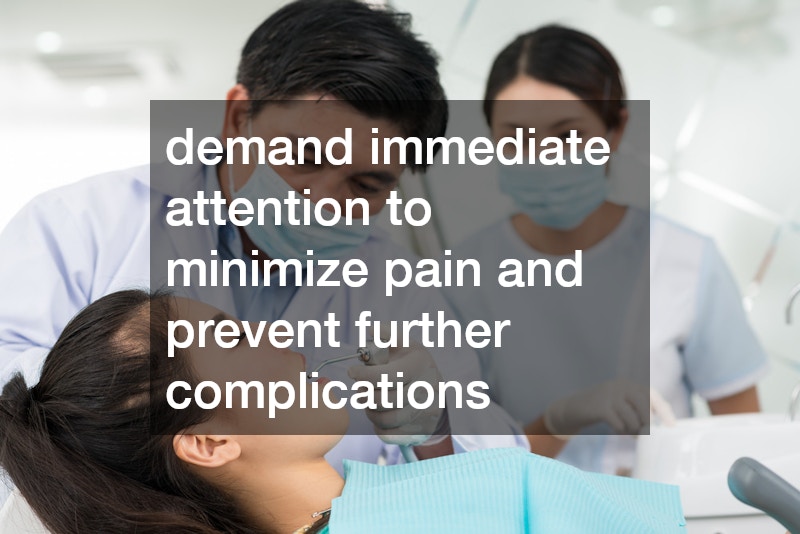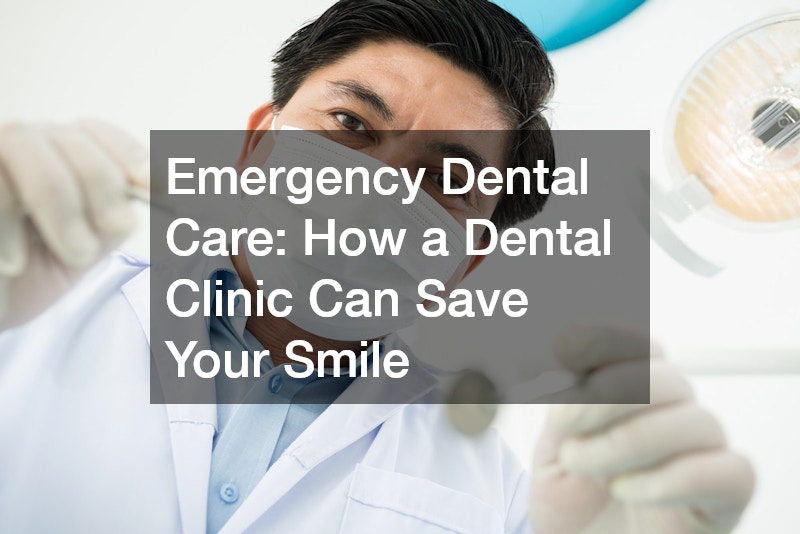A sudden dental issue, such as a severe toothache, a broken tooth, or an accident resulting in tooth loss, can disrupt your day and cause immense discomfort. These emergencies demand immediate attention to minimize pain and prevent further complications. Thankfully, professional dental clinics are equipped to handle these urgent situations and provide relief when you need it most.
Emergency dental care is designed to address urgent oral health concerns swiftly and effectively.
In this article, we’ll explore common dental emergencies, how a dental clinic can assist, and what actions you should take when faced with an urgent dental problem.
Recognizing a Dental Emergency
A dental emergency requires immediate care to alleviate pain, address trauma, or prevent further damage. Here are some of the most common examples:
1. Intense Tooth Pain
Sudden, sharp, or persistent tooth pain may indicate an issue such as a cavity, infection, or tooth fracture. Without prompt care, these conditions can worsen, leading to more serious health concerns.
2. Broken or Chipped Tooth
Cracking or chipping a tooth due to an injury or biting on hard food is common. If left untreated, this can expose sensitive parts of the tooth and increase the risk of decay or infection.
3. Knocked-Out Tooth
Losing a tooth due to an accident calls for immediate action. Acting quickly can potentially save the tooth.
4. Gum Swelling or Bleeding
Unexpected swelling or bleeding of the gums can signal gum disease, infection, or injury. Immediate care can prevent these issues from escalating.
5. Lost Crowns or Fillings
If a filling or crown falls out, it leaves the tooth exposed to damage and sensitivity. Quick intervention can restore its function and protect it from further harm.
6. Dental Abscess
An abscess is a serious infection that appears as a swollen, painful area near the tooth or gums. If untreated, it can lead to severe complications, including the spread of infection to other parts of the body.
How a Dental Clinic Can Help
Dental clinics are equipped to handle emergencies efficiently, providing rapid relief and effective solutions. Here’s how they typically address urgent cases:
1. Pain Relief
One of the first steps in emergency care is to address pain. Dentists use local anesthesia and other pain management techniques to ensure you are comfortable throughout the procedure.
2. Comprehensive Diagnosis
Dental clinics employ tools such as X-rays and thorough examinations to quickly identify the cause of the problem. Accurate diagnosis is critical for effective treatment.
3. Immediate Treatment
Depending on the situation, the clinic may provide:
Emergency fillings or sealants.
Repairs for cracked or broken teeth.
Antibiotics to address infections.
Root canals or other procedures to save a tooth.
4. Tooth Preservation
In cases where a tooth has been knocked out, a dentist may attempt to reinsert and stabilize it. Success depends on how quickly the tooth is handled and preserved.
5. Follow-Up Care
Once the immediate issue is resolved, clinics often schedule follow-up appointments to monitor recovery and plan any necessary restorative treatments.
What to Do During a Dental Emergency
Taking the right steps during a dental emergency can greatly improve the outcome. Follow these tips:
1. Remain Calm
Keeping a level head allows you to focus on the necessary actions and seek help efficiently.
2. Handle Teeth with Care
If a tooth has been knocked out, hold it by the crown (top part) and avoid touching the root. Rinse it gently with water and, if possible, place it back in the socket. If reinserting isn’t feasible, store it in a container with milk or saliva to keep it moist.
3. Apply First Aid
For bleeding, use clean gauze to apply gentle pressure. A cold compress on the outside of the mouth can help reduce swelling and pain.
4. Contact a Dental Clinic Immediately
Call your dentist to explain the situation and arrange an emergency visit. Many dental clinics offer after-hours services for urgent care.
5. Follow Instructions from the Dentist
Your dentist may provide guidance over the phone to manage the situation until you reach the clinic. Be sure to follow these directions closely.
Why Acting Quickly Is Critical
Delays in addressing dental emergencies can lead to worsening conditions, such as infections spreading or permanent tooth loss. Seeking prompt care at a dental clinic not only resolves immediate issues but also prevents future complications, preserving your oral health and overall well-being.
Preparing for Dental Emergencies
While it’s impossible to predict emergencies, preparation can make handling them easier. Keep the contact information of a trusted dental clinic accessible and familiarize yourself with their emergency protocols. Regular dental check-ups and good oral hygiene habits can also reduce the likelihood of emergencies occurring.
Conclusion
Dental emergencies are stressful, but knowing where to turn for help can make all the difference. A professional dental clinic is equipped to provide immediate relief, expert care, and long-term solutions to protect your smile.
Whether it’s a sudden toothache, a broken tooth, or a lost filling, taking swift action ensures the best possible outcome. Remember, addressing dental emergencies promptly not only restores your comfort but also safeguards your oral health for the future.
.


